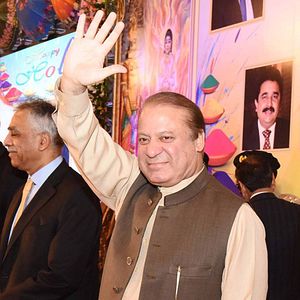On May 27, the Pakistan Muslim League-Nawaz-led (PML-N) federal government in Pakistan presented its final budget before the next general elections. The government has termed the budget a remarkable success. While the budget promises generous funds for infrastructure, development, education, health, and other sectors, the country’s economic realities point toward another reality. Let’s consider some so-called major accomplishments that the government appears to have achieved during the outgoing fiscal year.
The government claims that during fiscal year 2016-17, Pakistan’s fiscal deficit decreased from 4.8 percent to 4.2 percent of GDP. To ascertain these claims, while the ministry of finance has presented some macro level analysis, the government has been unable to address some of the very basic and essential questions that are central to the deficit’s rise or fall. For instance, the Economic Survey containing the financial details about the country’s fiscal deficit doesn’t explain how Pakistan was able to reduce its long-standing fiscal deficit and balance of payments crisis. Moreover, the survey doesn’t shed light on the question of whether the loans or money taken from China were incorporated into the fiscal deficit assessment.
Apparently the government’s claimed fiscal deficit decrease only deals with money taken from Western lenders, particularly the International Monetary Fund (IMF). In addition, the government has said that it doesn’t need any more loans from the IMF, for the country’s economy has now entered the phase where it can sustain its own economic burden. Such claims, however, seem puzzling, for the government has not presented any logical reasoning that may explain that Pakistan has not only decreased its multi-billion dollar deficit in such a short time.
The only explanation for the Pakistani government’s claims of having achieved some sort of economic independence is a deal with China. While it appears that Chinese loans and money that have bolstered Pakistan’s economic independence, it’s folly to argue that the country has now attained some level of fiscal independence when loans taken from Beijing are not part of the calculations upon which the government is basing its financial assessments. Pakistan may not be considering paying back Beijing’s loans in the short-run, but in the long-run they are going to remain part of Pakistan’s economic burdens, which are set to grow rapidly.
Additionally, the government has also claimed that Pakistan’s economy is now worth $300 billion. While it’s an optimistic sign for a country that is struggling to revive its economy, the government has not clarified that what percentage of this economy is built on foreign loans, grants, and other investments, where outside investors intend to acquire major equities in the country’s domestic enterprises, industry and infrastructure. For instance, one of the key factors that present a glaring picture of Pakistan’s loan dependent economy is the rapidly growing imbalance between the country’s imports and exports. The State Bank of Pakistan in a recently released report said that Pakistan’s net reserves have dropped largely due to the discrepancy between imports and exports. The report further notes that “this has caused Pakistan to seek emergency loans from outside sources to pay off previous debts made in foreign currencies.”
The development promises which the government has made for the next fiscal year require capital that Pakistan’s domestic economy cannot itself generate. According to some reports, Pakistan has to pay about $13 billion as markups on loans taken on just in the past fiscal year. Contrary to the government’s claims that Pakistan doesn’t need any more loans from IMF, the government has actively sought more foreign funds to steer the country’s economy. Over the past one year alone, China has given Pakistan more than $1.2 billion in loans to “help the country shave off a possible currency crisis.”
Unless the balance of trade improves, Pakistan’s fiscal deficit is only going to increase. Moreover, it will not only devalue the country’s currency, but will have negative implications for the country’s long term economic health. The government needs to work on issues that are going to affect Pakistan’s economy in the long run, rather than manipulating the record to suit their narrow political interests.
































